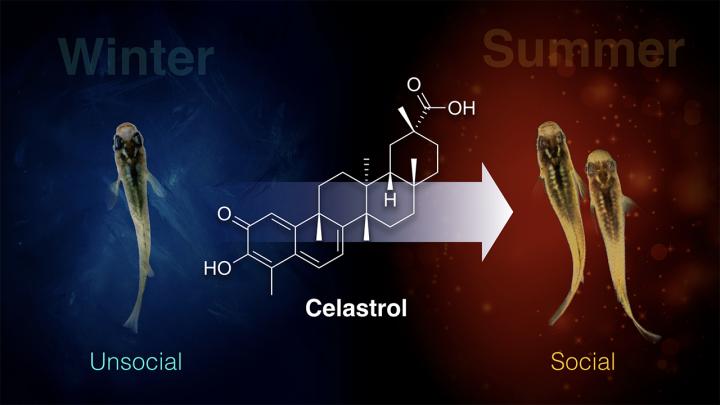Celastrol treats SAD-like symptoms in medaka fish

Credit: Issey Takahashi | Nagoya University ITbM
A group of animal biologists and chemists at the Institute of Transformative Bio-Molecules (WPI-ITbM), Nagoya University, has used a chemical genomics approach to explore the underlying mechanism of winter depression-like behavior and identified a drug that rescues winter depression-like behavior in medaka fish.
Seasonal changes in the environment can lead to depression- and anxiety-like behavior in humans as well as animals. At high latitudes, including northern regions of the United States and Nordic countries, about 10% of the population suffers from winter depression (Seasonal Affective Disorder: SAD), with typical symptoms including low mood, sleep problems, disrupted circadian rhythms, social withdrawal, decreased libido, and changes in appetite and body weight, and related suicide and social withdrawal becoming a serious public health issue.
Animal models play an essential role in understanding the mechanistic nature of biological and behavioral processes, as well as in the discovery of new drugs. Small fish such as medaka have emerged as powerful models for the study of complex brain disorders and have become valuable pharmacogenetic tools. Medaka were found to be an excellent animal model for winter depression, with decreased sociability and increased anxiety-like behavior in medaka exposed to winter conditions.
To understand the underlying mechanisms of winter depression, the research group employed a chemical genomics approach. An in vivo broad-spectrum chemical screen identified the traditional Chinese medicine, celastrol, as rescuing winter behavior. NRF2 is a celastrol target expressed in the habenula, known to play a critical role in the pathophysiology of depression. Although fish do not have a defined prefrontal cortex (PFC), the habenula is evolutionarily highly conserved and connects the limbic forebrain and monoaminergic system. Depression is considered an adaptation to a harsh environment. Given the striking parallels between patients with SAD and medaka kept under winter-like conditions, the present findings provide important insights into the mechanism of winter depression and offer new potential therapeutic targets for its treatment involving NRF2.
###
Media Contact
Takashi Yoshimura
[email protected]
Original Source
http://www.
Related Journal Article
http://dx.




